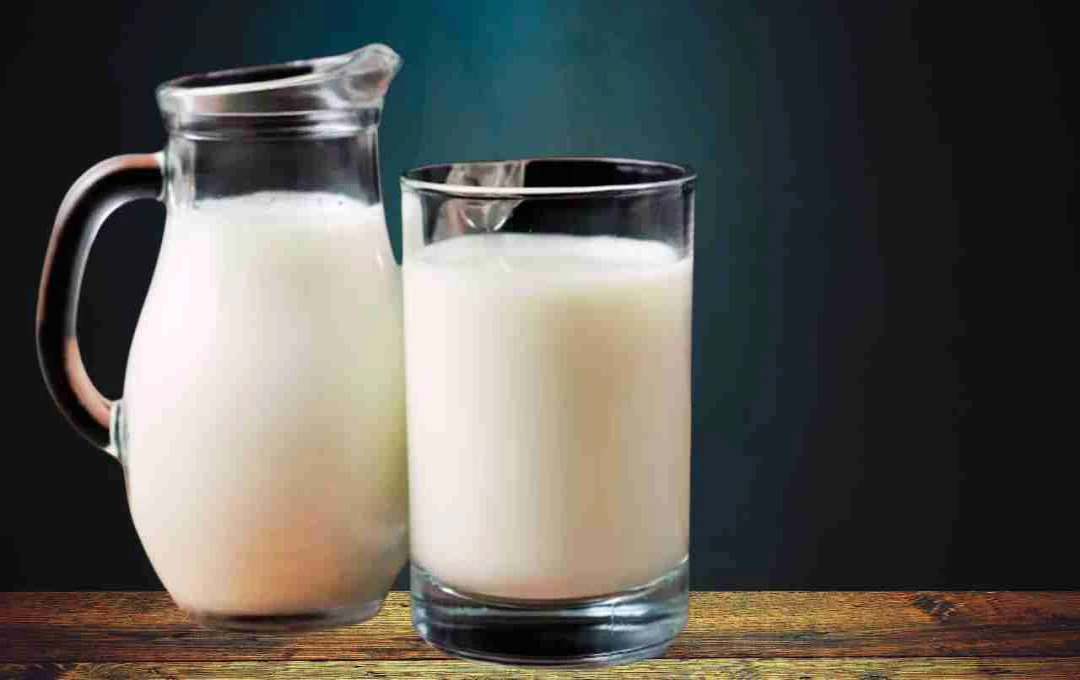Milk is considered beneficial for health in both Ayurveda and modern science. It contains essential nutrients like protein, calcium, vitamin D, and vitamin B12, which help strengthen bones, brain, and the immune system. But did you know that consuming milk at the wrong time or under certain conditions can also harm your health?
Drinking milk before bed is a common practice in India, but for some, this habit can be detrimental. Let's find out which five types of people should avoid drinking milk at night and why.
Nightly Milk is Not Beneficial for Those with Acidity and Indigestion
If you often experience acidity, gas, or heaviness in your stomach, drinking milk at night is not advisable. Milk takes a while to digest as it is heavy. Therefore, drinking milk at night can cause bloating and heartburn. You might also feel a heavy or bloated stomach upon waking up.

What to Do:
If you need to drink milk, warm it slightly and add turmeric. This makes the milk lighter and easier to digest. Also, try drinking milk in the morning or evening instead of at night. And remember not to drink milk immediately after a meal, as this can cause digestive problems.
Stay Away from Nightly Milk if You Want to Lose Weight
If you are trying to lose weight, you should avoid drinking milk at night. Milk contains fat and calories, which can accumulate in the body without physical activity. Consuming calorie-rich items before bed makes weight gain easier. Therefore, drinking milk at night can contribute to weight gain.
What to Do:
If you are on a diet, consume toned or skimmed milk instead of full-cream milk. Also, avoid adding sweets or dry fruits to your milk, as this can increase the calorie count. It's better to drink milk during the day so your body can digest it properly.
Milk Can Be Harmful for Those with Cough, Sinus, and Allergies
If you frequently suffer from cold, cough, phlegm, sinus, or allergies, drinking milk at night is not recommended. Milk increases mucus in the body, which can lead to nasal congestion and a feeling of scratchiness or heaviness in the throat. This discomfort is often more pronounced in the morning.
What to Do:
If you must drink milk, add a little ginger, black pepper, or turmeric. These ingredients reduce the mucus-producing effect of milk and provide relief. Also, try drinking milk during the day to prevent worsening allergy or sinus problems.
Diabetics Should Take Special Care
Diabetics should exercise caution when drinking milk at night. Milk contains lactose, a natural sugar that converts into glucose in the body, potentially raising blood sugar levels. Especially if you are not engaging in physical activity at night, drinking milk can pose a health risk.

What to Do:
Diabetics should avoid drinking milk at night without consulting their doctor. If permitted by a doctor, consume low-fat milk in limited quantities. Furthermore, monitor your sugar levels and get regular blood tests to maintain good health.
Milk is Absolutely Not Suitable for People with Lactose Intolerance
Drinking milk is not at all suitable for people with lactose intolerance. In this condition, the body cannot digest lactose, a sugar present in milk. This can lead to stomach pain, gas, indigestion, diarrhea, and vomiting after drinking milk. Such individuals should avoid drinking milk at any time, day or night, to prevent these problems.
What to Do:
People with lactose intolerance can consume lactose-free milk or opt for plant-based milk alternatives such as soy, almond, or oat milk. Consult your doctor or a specialist before consuming milk or milk alternatives to maintain good health.
What is the Right Time and Way to Drink Milk?

The right time and method of drinking milk can vary from person to person, as everyone's digestive system is different. If you do not have problems like acidity, diabetes, or allergies, you can drink milk at night, but some things need to be kept in mind:
- Always drink lukewarm milk; cold milk can be difficult for the body to digest.
- Adding turmeric, cardamom, or ginger to milk is beneficial; it enhances both the nutrition and effect of the milk.
- Avoid going to sleep immediately after drinking milk; taking a short walk or light physical activity is good.
- Maintain a gap of at least one hour between dinner and drinking milk for proper digestion.
Milk is considered a complete food, but this doesn't mean everyone can drink it at any time. If your health profile falls into any of the categories mentioned above, you should consult a doctor or nutritionist before consuming milk. Drinking milk at the wrong time or under the wrong conditions can cause harm instead of benefit.














